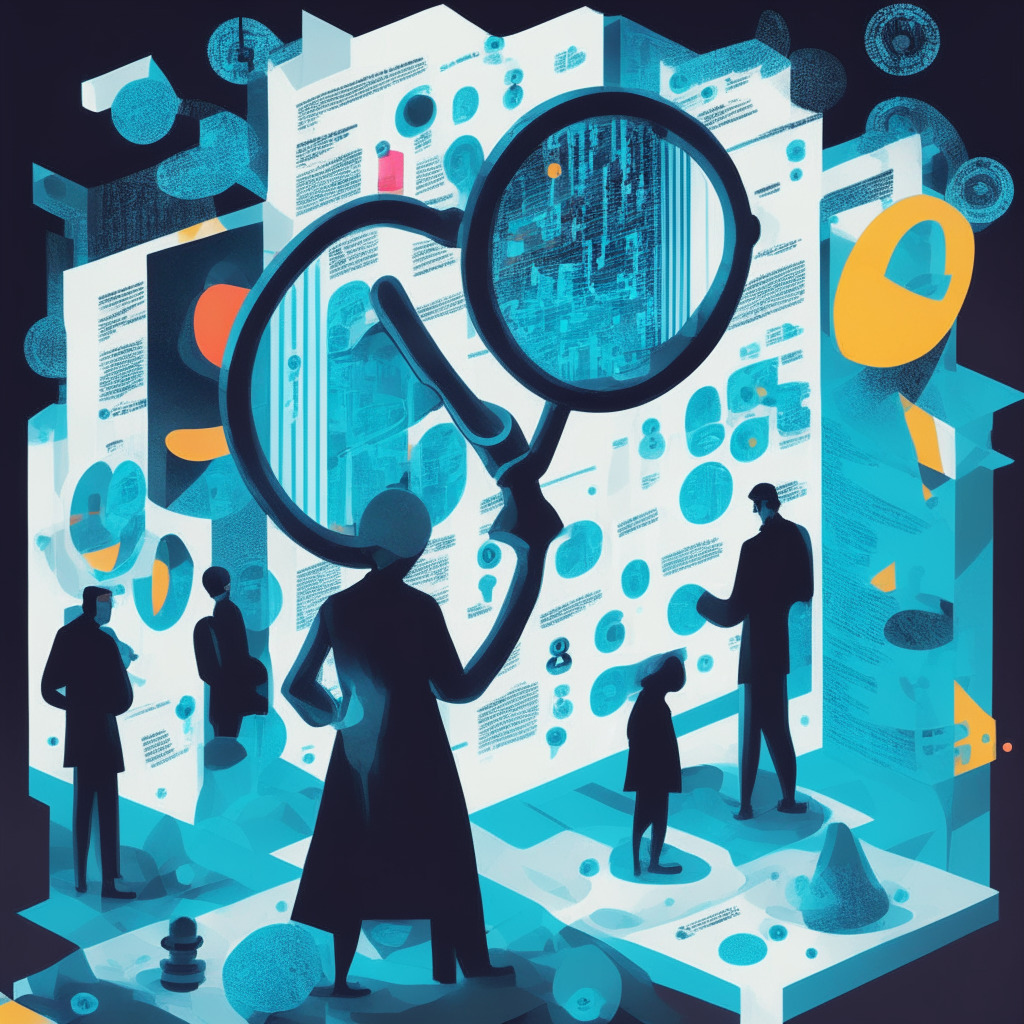The Blockchain Association, a leading crypto trade association, continues to face skepticism and regulatory hurdles despite its five-year existence. With progress impeded by the fall of FTX and reduced support from congress members, the association’s efforts to pass comprehensive crypto legislation remain unsuccessful. Notwithstanding these setbacks, it has managed some victories in mitigating impacts of proposed regulations and supporting member companies. However, the future still presents significant obstacles, and crypto lobbyists are urged to remain humble about their “achievements.”
Search Results for: Blockchain Association
Navigating Blockchain and NFTs with a Pumpkin Spice Latte: A Leap into Starbucks’ Odyssey
Starbucks is celebrating the 20th anniversary of its Pumpkin Spice Latte with non-fungible token (NFT) collectibles through its web3 rewards platform, Starbucks Odyssey. These NFTs, named “The PSL Collection: Spiced Stamp,” exhibit a unique merger of blockchain tech and customer loyalty programs, indicating the potential future of blockchain technology in the world of big brands.
The Battle of Blockchain Founder in Court: Bias, Intrigue and Financial Chaos
The jury selection process continues in the trial of FTX’s founder, Sam Bankman-Fried. Prospective jurors’ potential biases and previous financial losses in cryptocurrency pose as complexities. Judicial proceedings reveal the growth of blockchain technical jargon within the legal sector. Bankman-Fried’s charges include conspiracy, fraud, and unlawful customer deposit lending, putting the crypto world’s intersection with the traditional legal system under spotlight.
Unleashing Blockchain’s Potential: TradeFinex, SBI and the Balance of Transparency vs Regulation
“SBI Holdings is collaborating with United Arab Emirates’ TradeFinex to foster adoption of enterprise blockchain in Japan. This venture offers blockchain-based financial services and provokes a debate over whether such technology enhances financial transparency or circumvents regulatory oversight.”
Blockchain Storms the Cricket Pitch: Pros, Cons and Uncertainties about the 2023 World Cup Initiative
“The International Cricket Council (ICC) will use NEAR’s Blockchain Operating System for fan engagement during the 2023 Cricket World Cup. This blockchain-based method promises personalized experiences for fans, but requires technological understanding and constant updates to operate smoothly. This move further showcases NEAR’s interoperability capabilities.”
Hypothekarbank Lenzburg Navigates The Blockchain Wave: A Swiss Tale of Digital Assets & Risks
“Hypothekarbank Lenzburg, a Swiss bank with over $7 billion assets, has joined the Six Digital Exchange, becoming the sixth Swiss bank to do so. This move enables the bank to trade a variety of digital securities on a blockchain-oriented platform.”
Decoding Vitalik Buterin’s Privacy Pool Concept: Navigating Blockchain Privacy & Regulatory Compliance
Ethereum co-founder Vitalik Buterin’s proposed privacy pool concept focuses on combining blockchain privacy and regulatory compliance, sparking meaningful discussion in the crypto world. However, concerns over unclear compliance framework, implementation struggles, and acceptance issues remain to be addressed.
Pros and Cons of Vitalik Buterin’s “Privacy Pools”: Balancing Blockchain Transparency and Anonymity
“Vitalik Buterin co-authored a paper exploring a potential solution to the inherent privacy leak in blockchain, balancing privacy and compliance. The proposed synthesis of zero-knowledge proofs with “Privacy Pools” attempts to obscure crypto users’ blockchain history without associating with illicit activities. Critics, however, question this method’s legal and practical efficacy.”
Privacy and Blockchain: Debating the Role & Ramifications of Chainalysis Data Analytics
The Change.org petition “Stop Chainalysis” argues that the company’s data analysis tools are not scientifically verified, potentially violating privacy laws and rights by linking real-world identities to crypto payments. The petition warns about violations of the Bank Secrecy Act and the Fourth Amendment. It highlights the delicate balance between protecting privacy and combating illicit activities.
Modernizing Investor Protection: Blockchain, AI, and a National Financial Fraud Registry
“CFTC Commissioner Christy Goldsmith Romero aims to modernize investor protection through technological advances. Acknowledging the need to understand FinTech, cryptocurrency, blockchain and cybersecurity, she urges the implementation of KYC and AML protocols in decentralized finance. She believes federal regulators should utilize social media for tracing funds, crypto activities and issuing necessary warnings against scams.”
Ripple, SEC Legal Battle Intensifies: Implications for Crypto Regulations and Future of Blockchain
The SEC and Ripple are locked in a legal dispute over the application of securities law to Ripple’s handling of XRP. The SEC is reportedly seeking an appeals court intervention, to which Ripple argues is unnecessary. This ongoing rift could potentially impact the industry’s regulations and set a precedent for other crypto firms, symbolising how regulations could dictate the future of Blockchain.
Navigating Web3 Opportunities: The Emergence of Blockchain Gaming in Saudi Arabia’s Vision 2030
“Saudi Arabia’s shift from an oil-dependent economy to investing in blockchain gaming and Web3 captures attention. This redraws its economic blueprint under its ambitious Vision 2030 plan. With gaming sector investments on the rise, the kingdom seeks to explore the new internet wave, potentially positioning it as a global gaming hub.”
Harnessing Blockchain’s Potential in Africa: The Intricate Tug-of-War with Poverty
“Blockchain technology’s mainstream adoption in Africa hinges on poverty eradication. Stakeholders believe a society devoid of poverty forms a stronger environment for blockchain incorporation. Despite economic struggles, Nigeria’s significant interest in cryptocurrencies and potential for blockchain integration shows promise. Nevertheless, this progress depends on achieving economic stability.”
Blockchain Future in Nigeria: Regulatory Challenges and Optimism on the Road Ahead
The Digital Assets Summit by SIBAN discussed Nigeria’s regulatory stance on blockchain technology. Stakeholders addressed concerns over the Central Bank’s reluctance to adjust crypto policies. National IT Development Agency’s new Blockchain Policy shows government’s progressive stance, focusing on Web3 Education to improve blockchain’s penetration despite language barriers and regulatory uncertainties.
Blockchain Regulation: A Comparative Study of Nigeria’s Leaps and America’s Gains
“The article examines the progress of blockchain regulation from two contrasting perspectives: Nigeria, known for its cryptocurrency-awareness, and the US, with its comprehensive regulatory frameworks. The piece discusses the regulatory challenges in Nigeria and the US’s approach in achieving a balance between enforcement and tech evolution.”
Blockchain Literacy in Nigeria: A Struggle Amidst Linguistic Diversity and Regulatory Obstacles
Despite the growing blockchain and crypto awareness in Nigeria, key challenges remain around public education. Linguistic diversity poses difficulties in a country where over 500 languages are spoken. A disconnection between local banks and crypto-exchange firms further complicates the landscape. Nevertheless, Nigeria is proactive in overcoming these hurdles by implementing language-friendly education strategies about blockchain technology.
Unraveling Blockchain: Introducing Privacy Pools for Enhanced Security and Compliance
Vitalik Buterin and his co-authors introduced novel “privacy pools” in blockchain, addressing privacy issues and crime associated with privacy mixers. These pools utilize zero-knowledge technology to separate honest transactions from unlawful activities, encouraging transparency and honesty in this digitally decentralized environment. The future of blockchain looks promising yet challenging with regard to privacy and regulatory compliance.
Rethinking Crypto Taxation: Japan’s Blockchain Future Amidst Regulatory Complexities
Japan’s Financial Services Agency is looking to change its tax code related to digital assets, potentially eliminating annual tax on unrealized cryptocurrency gains. Advocates argue this could stimulate business and aid blockchain startups, but critics cite possible manipulation and volatility.
Japan’s Crypto Tax Reform: Boosting Blockchain Growth or Reducing Government Revenue?
Japan’s Financial Services Agency is overhauling cryptocurrency regulations, focusing on tax systems for companies holding crypto assets. The proposals aim to amend the rule of taxing unrealized gains, a model criticized for hindering innovation in the blockchain and digital asset sector.
Jump Crypto Specialists Leave to Found Douro Labs: A Strategic Shift or Split in the Blockchain Scene?
Innovative blockchain project Douro Labs, established by ex-Jump Crypto specialists, aims to solve scaling issues within Pyth Network – a blockchain-based Oracle data service instrumental in orchestrating crypto, equity, and FX data across multiple blockchains. This marks a significant shift within the volatile digital trading landscape.
Binance Quietly Removes Banco de Venezuela: Blockchain Freedom Versus Economic Sanctions
Cryptocurrency exchange Binance has silently removed Banco de Venezuela from its P2P service list, mirroring U.S Treasury-imposed financial sanctions. The move raises concerns among Venezuelan crypto enthusiasts, notably because the bank plays a crucial role in Venezuela’s digital currency ecosystem. Despite the silent removal, users can reportedly circumnavigate the ban due to the P2P nature of the services.
Clashing Giants: Gitcoin and Shell’s Controversial Partnership for Blockchain Climate Solutions
The blockchain platform Gitcoin and oil-rich Shell have formed a controversial partnership aimed at developing “open-source climate solutions.” Many critics within the crypto community view this alliance as questionable, indicating that the intersection between advanced blockchain technology and ethical responsibility remains a significant challenge.
Nova Labs’ Disruptive $5 Month Phone Plan: A Revolutionary Bet on Blockchain and 5G Technology
Nova Labs, a blockchain startup, revealed plans for a $5 monthly phone plan using 5G hotspots owned by individuals and businesses. This service aims to disrupt the telecom industry, supported by the startup’s Helium Network which rewards hotspot owners with crypto tokens for data provided to customers.
Unveiling Nigeria’s Blockchain Revolution: Rethinking National Youth Service Certification
The Nigerian government is leveraging blockchain technology to counter certificate forgery in their National Youth Service Scheme. This marks a transformation towards digital certification, potentially optimizing hiring practices by ensuring document legitimacy. The country’s adoption of blockchain aims to bolster transparency and promote sustainable economic growth.
Decoding Systemic Risks in Blockchain Universe: The G-SIP Protocol and Beyond
“The Global Systematically Important Protocol (G-SIP), inspired by traditional banking, offers a benchmark for identifying and measuring potential systemic risk in DeFi institutions. This tool could prove crucial in preventing market crashes, demonstrating both the potential and inherent risks within decentralized finance and the blockchain universe.”
Balancing Business Development and Tech in Blockchain Companies: A Symphony for Success
“The success of blockchain companies depends not only on technological prowess but also on effective business development strategies. These include targeting a specific market, telling a resonant brand story, and fostering connections through partnerships and events. Database management, maintaining operational standards, and ensuring customer satisfaction are also crucial aspects. Striking a balance between these elements is key to achieving success in the crypto and blockchain industry.”
Barbie, Bitcoin and Big Ken Energy: How Mattel Blends Blockchain with Feminism
While actress Margot Robbie jokingly associated Bitcoin discussions with ‘Big Ken Energy’, Mattel, the company behind ‘Barbie’, is showing deep faith in blockchain’s potential. They’ve already released Barbie-themed NFTs and launched a marketplace on the Flow blockchain for trading Mattel NFTs. This portrays a shift from vanity to creativity and innovation, showing how entertainment majors are seriously engaging with blockchain and NFTs.
Preserving Cultural Heritage with Blockchain: Exploring the Potential of Salsal
“Salsal, a Web3-based verification-as-a-service model, bridges the gap between historical artifacts and an unalterable on-chain validation system. It aims to identify, grade, and record information about artifacts, transforming them into non-fungible tokens (NFTs). An immutable blockchain-based registry could deter theft and illegal extraction, preserving humanity’s priceless cultural artifacts.”
Coinbase Layer 2 Blockchain’s Meme Coin Madness: BALD Vs. HAIRY
The BALD coin, operating on Coinbase’s Layer 2 Blockchain, experienced an immense value surge of up to 4 million percent. Meanwhile, the HAIRY coin, potentially from the same creators and operating on Ethereum’s blockchain, saw an 8,000% increase. Despite considerable interest, linked primarily to speculative associations with Coinbase’s CEO, investors are urged to approach with caution as the future of these meme coins remains uncertain.
Bank of Italy’s DeFi Experiment: A Landmark in Blockchain Implementation or Regulatory Challenge?
“The Bank of Italy has partnered with Polygon and Fireblocks to create a regulated platform for ‘institutional DeFi’, a first of its kind. This initiative envisions larger-scale tokenized asset projects, despite significant regulatory challenges and skepticism towards digital assets. Supported by traditional financial institutions and technology companies, this marks a shift in the future of finance.”
Navigating Gary Gensler’s Impact on Crypto: Regulator or Roadblock to Blockchain’s Future?
“Gensler’s belief in blockchain’s potential to transform finance is clear. However, his focus on the regulatory role of intermediaries, seen in SEC enforcement actions against Coinbase and Binance, reflects a top prioritization of controlling systemic risks.”
Blockchain: Revolutionizing Digital Finance or Opening Pandora’s Box?
“Blockchain technology asserts individual control over transactions, minimizes fraud risk, and offers transaction traceability. However, its decentralisation invites concerns over regulation, its robust security is still vulnerable, and its transparency could lead to privacy issues. Its future carries both potential and uncertainty.”































